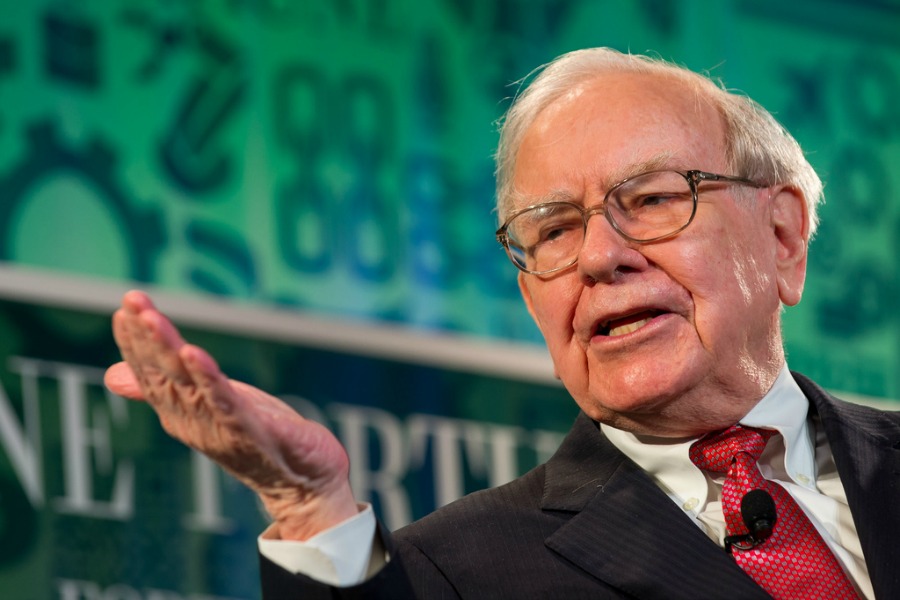What changes has Warren Buffett made to his investments?
The Sage of Omaha has rejigged Berkshire Hathaway’s holdings – here’s what it all means.
18th February 2021 14:06
by Graeme Evans from interactive investor
The Sage of Omaha has rejigged Berkshire Hathaway’s holdings – here’s what it all means.

Where Warren Buffett goes investors tend to follow, which is why Berkshire Hathaway (NYSE:BRK.B) selling Apple (NASDAQ:AAPL) shares in order to buy big in telecoms, oil and healthcare is major news this week.
Not that the Sage of Omaha has lost faith in the world’s most valuable company, given that Apple remains his conglomerate’s biggest holding with a stake currently worth $117 billion (£83.84 billion).
But by reducing the Apple exposure by 6% in the final quarter of 2020, Berkshire Hathaway has been able to make major bets on Verizon Communications (NYSE:VZ) and oil giant Chevron Corp (NYSE:CVX).
Shares in the pair were more than 2% higher in the session following Berkshire’s quarterly disclosure to the U.S. Securities and Exchange Commission detailing its US-listed stock holdings at the end of December.
Led by legendary investor and businessman Buffett, Berkshirehas become such a bellwether for investors that it has permission from regulators to delay disclosure on its dealings so that the price of its targets is not distorted before it has finished buying.
More details on the company’s performance are due on Saturday next week, when Berkshire posts its annual results and 90-year-old Buffett releases his annual shareholder letter.
As well as his thoughts on the economic and stock market outlook following Covid-19, it will be interesting to see if the recent explosion in the value of cryptocurrency bitcoin is mentioned, given that he previously described it as being worthless and a delusion.
The forces of Covid-19 are reflected in Berkshire’s fourth quarter activity after it upped its investments in drug makers AbbVie (NYSE:ABBV), Bristol-Myers Squibb Company (NYSE:BMY) and Merck & Co (NYSE:MRK). A small stake in vaccine maker Pfizer (NYSE:PFE) was sold, one of five stocks to be dumped in the period.
- Backing from Elon Musk’s Tesla sends bitcoin price rocketing
- Why are so many global funds underperforming the index?
- Will this be the decade that Asia leaves the US in the dust?
The others were Barrick Gold Corp (NYSE:GOLD), M&T Bank (NYSE:MTB), PNC Financial Services (NYSE:PNC) and JPMorgan Chase (NYSE:JPM). This flight from the banking sector amid continued low interest rates also saw Berkshire’s stake in Wells Fargo (NYSE:WFC) reduced by almost 59%, to leave a stake worth $1.5 billion. It is still a major investor in Bank of America (NYSE:BAC), Bank of New York Mellon Corp (NYSE:BK) and American Express (NYSE:AXP).
The biggest move by Berkshire involved taking a much bigger position in phone company Verizon, which now accounts for an $8.6 billion stake compared with $3.4 billion previously.
Verizon’s 2020 results at the end of January showed momentum in the fourth quarter, with increased cash flow, wireless service revenue growth and the nationwide launch of its 5G network. The pandemic has also accelerated favourable trends on virtual collaboration, remote working, distance learning and telemedicine.
- ii view: Verizon dividend yield still attractive
Want to buy and sell international shares? It’s easy to do. Here’s how
The 10% change in Chevron holding to more than $4 billion comes as oil prices have continued to recover on the back of the vaccine-driven economic rebound. Heavyweight stocks left untouched in the 47-strong Berkshire portfolio over the quarter include Coca-Cola (NYSE:KO) and Kraft Heinz (NASDAQ:KHC), who rose in value by 11% and 16% respectively on the previous filing.
Berkshire also owns more than 90 businesses, including Geico car insurance, railroad operations, gas and electric utilities and manufacturing businesses.
A cash balance of more than $140 billion continues to pose questions for shareholders, given that it could be used for a major acquisition or for investor returns. Share buy-backs over its most recent quarter were a record $9.3 billion.
These articles are provided for information purposes only. Occasionally, an opinion about whether to buy or sell a specific investment may be provided by third parties. The content is not intended to be a personal recommendation to buy or sell any financial instrument or product, or to adopt any investment strategy as it is not provided based on an assessment of your investing knowledge and experience, your financial situation or your investment objectives. The value of your investments, and the income derived from them, may go down as well as up. You may not get back all the money that you invest. The investments referred to in this article may not be suitable for all investors, and if in doubt, an investor should seek advice from a qualified investment adviser.
Full performance can be found on the company or index summary page on the interactive investor website. Simply click on the company's or index name highlighted in the article.